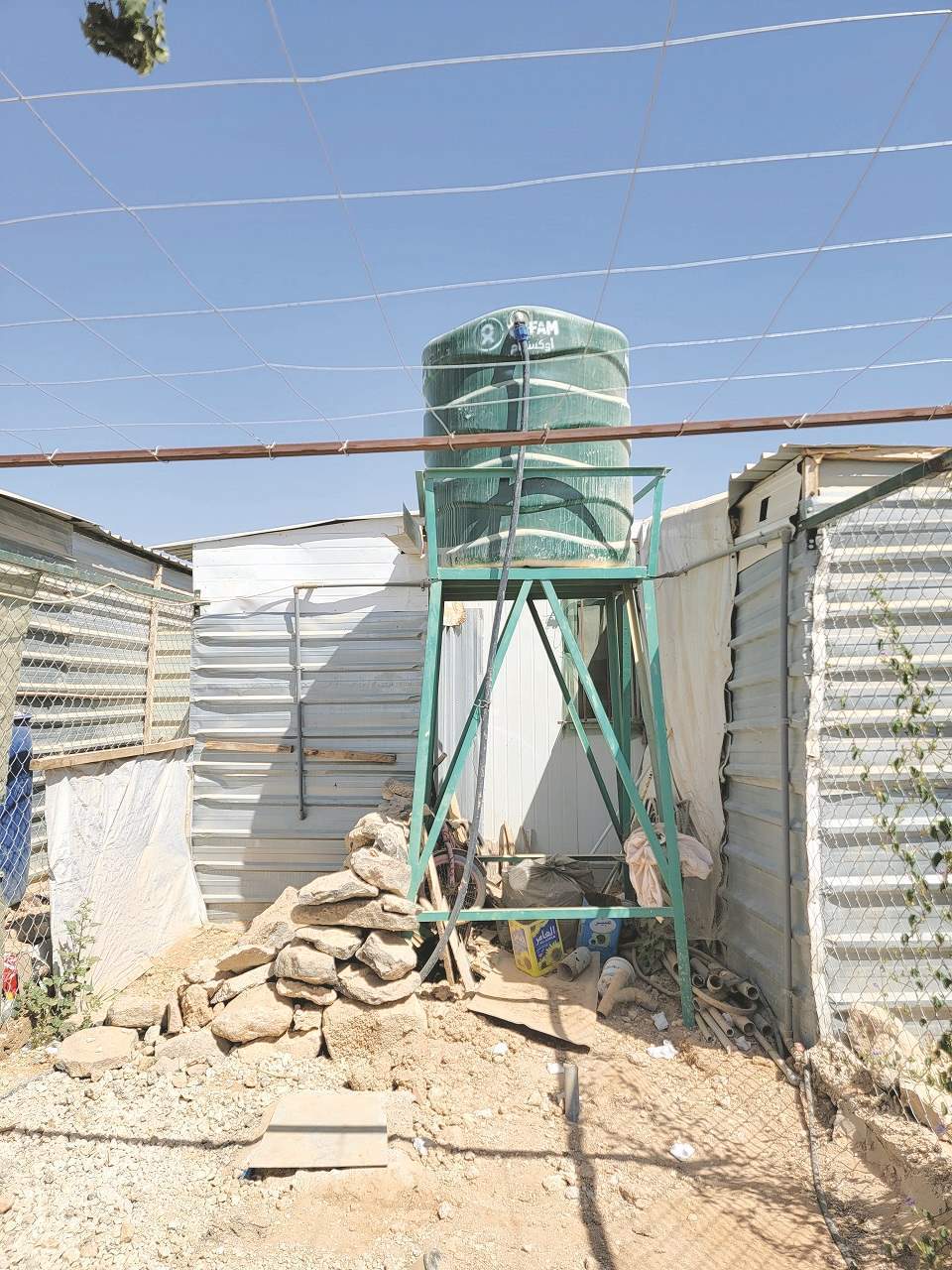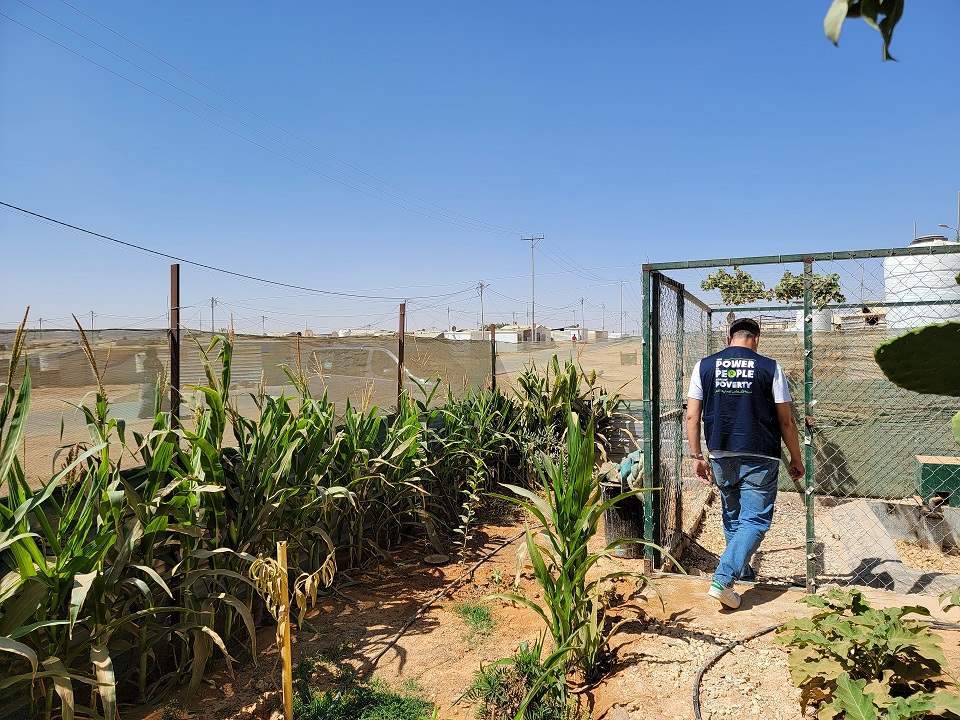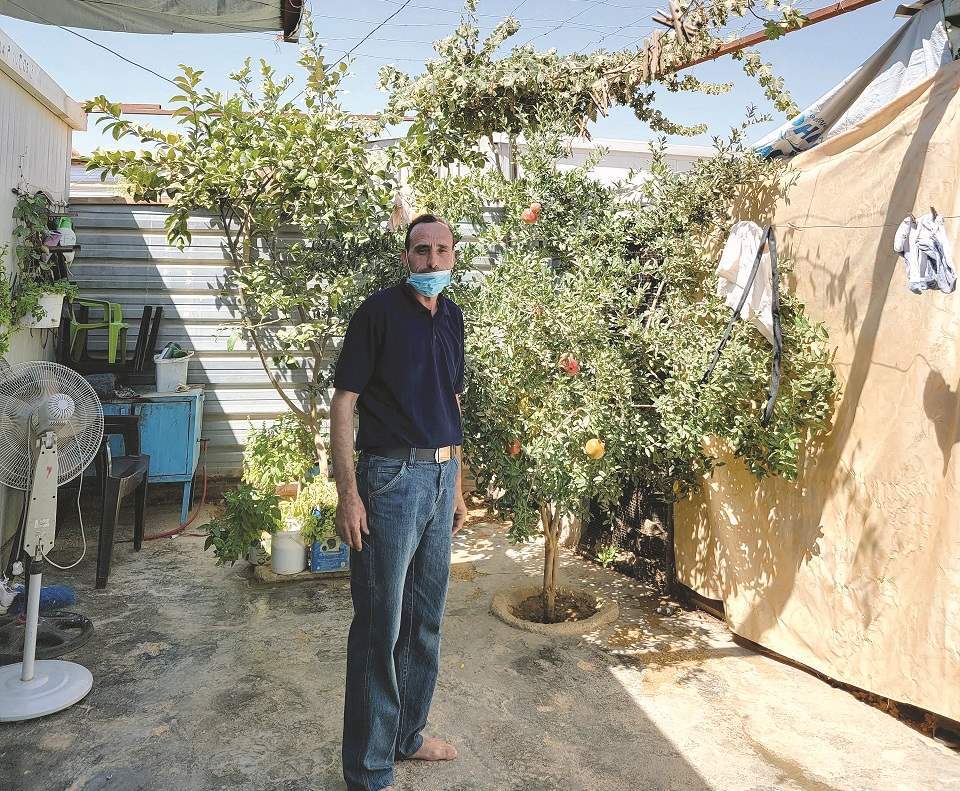AMMAN — Water security has always been an issue for Um Amjad, a 55-year-old Syrian refugee who’s name has been changed to protect her identity, and who still lives in the Zaatari refugee camp, which currently houses 80,000 Syrian refugees.
اضافة اعلان
There were times, she recalls, when she had to buy mineral water and use it for washing up at home. There was no other option, they needed water to simply “use the bathroom and perform ablution” until their next turn to receive their water ration was due, Um Amjad said.
As she depends on aid from the World Food Program, which amounts to JD115 a month for a household of five, finding the money to buy water was not easy.
Even when water was “very scarce” at the camp, Um Amjad learned to conserve water without having to compromise on the things she loves. “When we first arrived, there was nothing green. We were used to greenery and trees in Syria,” she said, adding that she planted a few trees to try and adapt to her new life.
 A water program in Zaatari camp aims to reuse water from showers and sinks to green the area and in some instances grow food. (Photos: Lina Shannak/Jordan News)
A water program in Zaatari camp aims to reuse water from showers and sinks to green the area and in some instances grow food. (Photos: Lina Shannak/Jordan News)
Aware that the quantity of available water would not be enough for irrigation, Um Amjad created her own manual system for reusing water. Instead of wasting the water that goes down the sink after washing her vegetables, she learned to reuse it to irrigate her plants.
This year, she received a call from Oxfam and was told that she qualified for the “greywater reuse” system, which would be installed at her residence to enable her to reuse water that does not come into contact with human feces.
Based on the applied criteria, her household could only accommodate a system that enables her to reuse sink water in the bathroom to flush toilets.
Several months after the installation of the system, Um Amjad said: “It helped us save a lot of water ... we used to waste clean water on flushing.” As she continues to irrigate her plants by manually reusing water from her kitchen sink, she thinks their water situation is improving, as she now no longer runs out of water.
Grey water is wastewater from kitchen sinks and bathroom showers and hand basins and laundry which accounts for between 50 to 80 percent of the domestic household consumption, according to a study on its reuse for agricultural purposes in the Jordan Valley.
 A water program in Zaatari camp aims to reuse water from showers and sinks to green the area and in some instances grow food. (Photos: Lina Shannak/Jordan News)
A water program in Zaatari camp aims to reuse water from showers and sinks to green the area and in some instances grow food. (Photos: Lina Shannak/Jordan News)
During a visit organized by Oxfam,
Jordan News met with the head of the Public Health Engineering department in the Zaatari refugee camp, Walid Arar, who said that their grey water project had evolved out of several consultations with the local community. Arar said that water supply in the camp is limited to 45 and 55 liters per capita per day in winter and summer respectively. He said that they have noticed an increased demand for water in the camp since the COVID-19 pandemic.
“The quantity is obviously not sufficient for many reasons,” Arar said, adding there are several cultural factors at play, one being that Syrian refugees had never experienced water shortages in their home country. A few years ago, Oxfam started conducting focus group discussions with refugees to discuss water conservation.
“We introduced the greywater concept to them, and apparently they had already known about it and some people had already implemented it,” Arar said, explaining that many refugees reused unfiltered greywater mainly to irrigate plants, relying on basic equipment at their disposal.
“They wanted to green the camp,” Arar said, adding that this would be beneficial to their “mental health,” but it remained critical in a country that is among the poorest in the world in terms of water resources. In this context, the grey water project could be a solution, as people could reuse water that would otherwise be wasted.
Following these discussions, Oxfam began targeting the most vulnerable households in terms of water consumption. Those households that needed more water had to apply and answer questions describing their household’s situation and any conditions that necessitated additional water consumption, such as having family members suffering from disabilities or diabetes among other factors.
Should the square area of the household allow it, those who succeed in their application to get more water can have a system installed that filters water for reuse in flushing toilets and irrigating non-edible plants. Other households, on the other hand, could only accommodate a different system that is only used to flush toilets, according to Arar.
To date, Oxfam, which covers only half of the camp’s area, has installed the grey water systems in two mosques, 106 households, and 17 schools under a Partnership Component Agreement with UNICEF.
 Mohammad Saadi, a Syrian refugee who arrived in Jordan in 2013, is pictured on September 21, 2021, next to his garden, which he waters using runoff.
Mohammad Saadi, a Syrian refugee who arrived in Jordan in 2013, is pictured on September 21, 2021, next to his garden, which he waters using runoff.
Mohammad Saadi, a Syrian refugee who arrived in Jordan in 2013, also had the system installed at his residence a few months ago. “Agriculture and plants are very comforting to humans, regardless of their economic benefit,” he said.
A father of eight, Saadi works as a teacher in the camp, but he is passionate about farming, which he practiced in Daraa in southern Syria. When he first arrived at the camp, Saadi could not find a single tree, but the area was beginning to change and had already become greener.
A few years ago, he suddenly found that a seed had grown into a tree in his yard. Excited to see this unexpected plant, he started irrigating it by reusing runoff from his sink without filtering it. “Necessity is the mother of invention. I wanted water to irrigate the tree, but I couldn’t use drinking water, so I had to look for an alternative,” Saadi said.
He told
Jordan News that he was surprised to see the greywater system installed at his friend’s house. When he knew that he too could apply for one, he did so immediately so he could create a little grove around his unit. Today, he grows many plants, such as yellow and white corn that he is still “experimenting with” to see if he could use the corn feed for the chickens he is raising at home.
Commenting on the project, Tanya Chapuisat, UNICEF representative in Jordan, in a statement said that the project aims to “transition to more sustainable, equitable WASH service delivery in Zaatari camp.” Adding that in its pilot phase, the greywater project has managed to “efficiently reduce water consumption, change people’s behavior in terms of water conservation, and raise awareness and knowledge of the value of clean water.” She went on to say that young refugees learned how to implement a simple “grey water reuse system, using some available items and pipes.”
However, UNICEF is still in the process of assessing the greywater project’s impact before deciding on the next step. Chapuisat said that more than 115,000 Syrian refugees, a majority of whom are women and children, continue to live in camps and depend on UNICEF and its partners for the daily provision of critical lifesaving water and sanitation services. “If these needs are not met, the health and wellbeing of refugees in Zaatari camp will be greatly affected,” she said.
Read more Lifestyle



